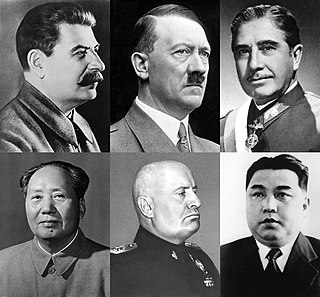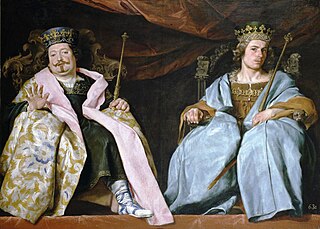
Constitutional monarchy, also known as limited monarchy, parliamentary monarchy or democratic monarchy, is a form of monarchy in which the monarch exercises their authority in accordance with a constitution and is not alone in making decisions. Constitutional monarchies differ from absolute monarchies in that they are bound to exercise powers and authorities within limits prescribed by an established legal framework.

A dictator is a political leader who possesses absolute power. A dictatorship is a state ruled by one dictator or by a small clique. The word originated as the title of a Roman dictator elected by the Roman Senate to rule the republic in times of emergency.

A dictatorship is an autocratic form of government which is characterized by a leader, or a group of leaders, who hold governmental powers with few to no limitations. Politics in a dictatorship are controlled by a dictator, and they are facilitated through an inner circle of elites that includes advisers, generals, and other high-ranking officials. The dictator maintains control by influencing and appeasing the inner circle and repressing any opposition, which may include rival political parties, armed resistance, or disloyal members of the dictator's inner circle. Dictatorships can be formed by a military coup that overthrows the previous government through force or they can be formed by a self-coup in which elected leaders make their rule permanent. Dictatorships are authoritarian or totalitarian, and they can be classified as military dictatorships, one-party dictatorships, personalist dictatorships, or absolute monarchies.

A government is the system or group of people governing an organized community, generally a state.
A head of state is the public persona of a sovereign state. The specific naming of the head of state depends on the country's form of government and separation of powers; the head of state may be a ceremonial figurehead or concurrently the head of government and more.
A monarch is a head of state for life or until abdication, and therefore the head of state of a monarchy. A monarch may exercise the highest authority and power in the state, or others may wield that power on behalf of the monarch. Usually a monarch either personally inherits the lawful right to exercise the state's sovereign rights or is selected by an established process from a family or cohort eligible to provide the nation's monarch. Alternatively, an individual may proclaim oneself monarch, which may be backed and legitimated through acclamation, right of conquest or a combination of means.
A monarchy is a form of government in which a person, the monarch, is head of state for life or until abdication. The political legitimacy and authority of the monarch may vary from restricted and largely symbolic, to fully autocratic, and can span across executive, legislative, and judicial domains.
A republic, based on the Latin phrase res publica, is a state in which political power rests with the public through their representatives—in contrast to a monarchy.
Aristocracy is a form of government that places power in the hands of a small, privileged ruling class, the aristocrats. The term derives from the Greek αριστοκρατία (aristokratía), meaning 'rule of the best'.
Autocracy is a system of government in which absolute power is held by the ruler, known as an autocrat. It includes most forms of monarchy and dictatorship, while it is contrasted with democracy and feudalism. Various definitions of autocracy exist. They may restrict autocracy to cases where power is held by a single individual, or they may define autocracy in a way that includes a group of rulers who wield absolute power. The autocrat has total control over the exercise of civil liberties within the autocracy, choosing under what circumstances they may be exercised, if at all. Governments may also blend elements of autocracy and democracy, forming an anocracy. The concept of autocracy has been recognized in political philosophy since ancient times.

A tyrant, in the modern English usage of the word, is an absolute ruler who is unrestrained by law, or one who has usurped a legitimate ruler's sovereignty. Often portrayed as cruel, tyrants may defend their positions by resorting to repressive means. The original Greek term meant an absolute sovereign who came to power without constitutional right, yet the word had a neutral connotation during the Archaic and early Classical periods. However, Greek philosopher Plato saw tyrannos as a negative word, and on account of the decisive influence of philosophy on politics,
Plato deemed tyranny the "fourth and worst disorder of a state." Tyrants lack "the very faculty that is the instrument of judgment"—reason. The tyrannical man is enslaved because the best part of him (reason) is enslaved, and likewise, the tyrannical state is enslaved, because it too lacks reason and order.

A presidential system, or single executive system, is a form of government in which a head of government, typically with the title of president, leads an executive branch that is separate from the legislative branch in systems that use separation of powers. This head of government is in most cases also the head of state. In a presidential system, the head of government is directly or indirectly elected by a group of citizens and is not responsible to the legislature, and the legislature cannot dismiss the president except in extraordinary cases. A presidential system contrasts with a parliamentary system, where the head of government comes to power by gaining the confidence of an elected legislature.

A dynasty is a sequence of rulers from the same family, usually in the context of a monarchical system, but sometimes also appearing in republics. A dynasty may also be referred to as a "house", "family" or "clan", among others.

Basileus is a Greek term and title that has signified various types of monarchs in history. In the English-speaking world it is perhaps most widely understood to mean "monarch", referring to either a "king" or an "emperor" and also by bishops of the Eastern Orthodox Church and Eastern Catholic Churches. The title was used by sovereigns and other persons of authority in ancient Greece, the Byzantine emperors, and the kings of modern Greece.
Politeia is an ancient Greek word used in Greek political thought, especially that of Plato and Aristotle. Derived from the word polis ("city-state"), it has a range of meanings from "the rights of citizens" to a "form of government".

Diarchy, duarchy, or duumvirate is a form of government characterized by corule, with two people ruling a polity together either lawfully or de facto, by collusion and force. The leaders of such a system are usually known as corulers.
Classical republicanism, also known as civic republicanism or civic humanism, is a form of republicanism developed in the Renaissance inspired by the governmental forms and writings of classical antiquity, especially such classical writers as Aristotle, Polybius, and Cicero. Classical republicanism is built around concepts such as liberty as non-domination, self-government, rule of law, property-based personality, anti-corruption, abolition of monarchy, civics, civil society, common good, civic virtue, popular sovereignty, patriotism and mixed government.
In political science, sultanism is a form of authoritarian government characterized by the extreme personal presence of the ruler in all elements of governance. The ruler may or may not be present in economic or social life, and thus there may be pluralism in these areas, but this is never true of political power.
In political science, despotism is a form of government in which a single entity rules with absolute power. Normally, that entity is an individual, the despot, but societies which limit respect and power to specific groups have also been called despotic.






